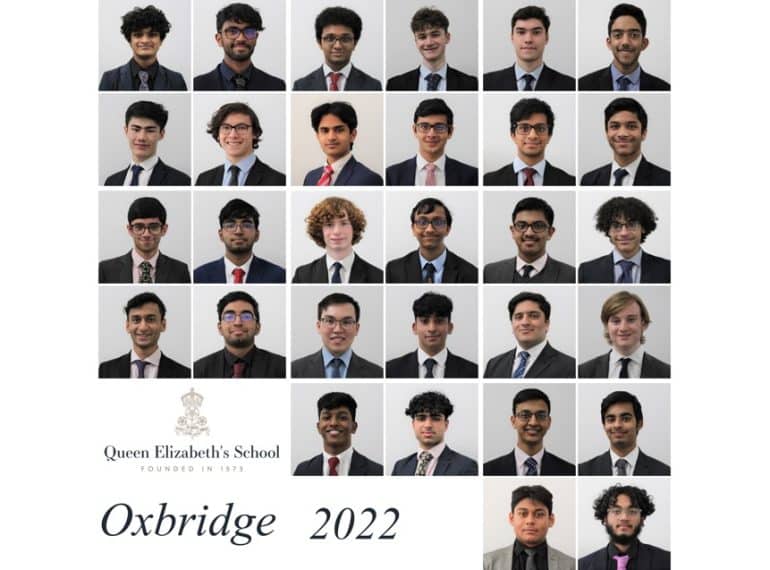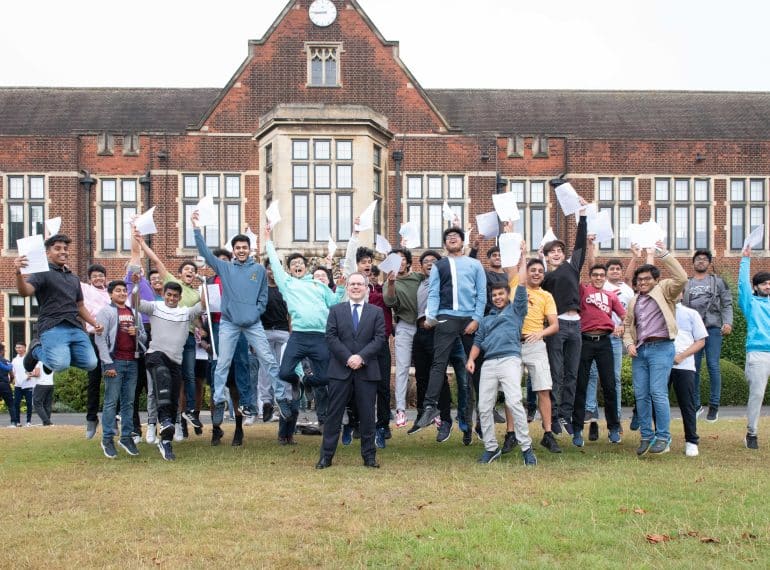
QE is today celebrating its best-ever results, with seven out of every ten A-levels awarded the highest-possible A* grade.
The results are yet another golden achievement at the end of a year that has seen the School earn an ‘outstanding’ rating from Ofsted, win the Sunday Times’ coveted State Secondary School of the Year title, and secure 35 Oxbridge offers.
 Not only are the results better than in the past two years, when no examinations were taken and figures were based on assessments, but they are also up on the last pre-pandemic year of 2019.
Not only are the results better than in the past two years, when no examinations were taken and figures were based on assessments, but they are also up on the last pre-pandemic year of 2019.
Headmaster Neil Enright said: “Exams are back, everything is back, and all the better for it! This has truly been an annus mirabilis for QE, and I am delighted that we have been able to crown the year with such a magnificent set of results, notable especially for a substantial increase at the very top.
“These brilliant outcomes are well deserved and are testament to both the talent and dedication of pupils and staff, and to the quality of education maintained throughout the last two-and-a-half years.
 “The return of public exams has given the boys the opportunity to clearly demonstrate the fruits of their continued hard work and focus during the challenges of the pandemic, and their strong motivation to push forwards.
“The return of public exams has given the boys the opportunity to clearly demonstrate the fruits of their continued hard work and focus during the challenges of the pandemic, and their strong motivation to push forwards.
“The fact that nationally pupils are being warned of lower grades and unusually strong competition for university places makes our own boys’ results all the more impressive: the vast majority here will secure their first choice of university, although of course, staff will be on hand today to guide and support anyone in need of help or advice.”
Among the many highlights of today’s results at QE are the following:
 A* grades amount to 69.9% of all results – up 10.4% on 2021 (when there were Teacher Assessed Grades or TAGs), and up from 45.3% in 2019; *
A* grades amount to 69.9% of all results – up 10.4% on 2021 (when there were Teacher Assessed Grades or TAGs), and up from 45.3% in 2019; *- 92.2% of results are at A*–A, again higher than during the pandemic and up 6% on 2019; *
- The A*-B figure is 98.3%, again higher than 2021’s TAGs. This is the 17th consecutive year above 95% for this benchmark figure;
- 71 of the 167-strong cohort (42.5%) have achieved straight A* grades;
- All 50 Economics candidates are awarded either A* (37) or A (13); similarly, there are no grades lower than A for English, French, Geography, Latin, Music and Sociology;
- Mathematics was taken by 139 boys (83% of the year group), with more than four out of five pupils (82.0%) achieving A*.
 Mr Enright said: “As the Ofsted report helpfully pointed out, at QE, we are resolutely determined to keep up the momentum with further improvements. It’s not just about academic results – important though these are – but about achieving our mission to develop fully-rounded young men ready to make a positive impact in a fast-changing world.
Mr Enright said: “As the Ofsted report helpfully pointed out, at QE, we are resolutely determined to keep up the momentum with further improvements. It’s not just about academic results – important though these are – but about achieving our mission to develop fully-rounded young men ready to make a positive impact in a fast-changing world.
“Extra-curricular activities here are flourishing: it was wonderful to open our state-of-the-art Music school in May and to celebrate boys’ endeavours in fields as diverse as drama, translation, robotics, debating, engineering and cricket.
“At the same time, many of our boys are involved in volunteering and charity work, while our pastoral programme aims to ensure that the School remains a happy, inclusive environment for boys from all backgrounds.”
* October 18th 2022. Following appeals and re-marks, the proportion of A* grades has increased to 70.7%, while the figure for A*-A has risen to 92.8%.

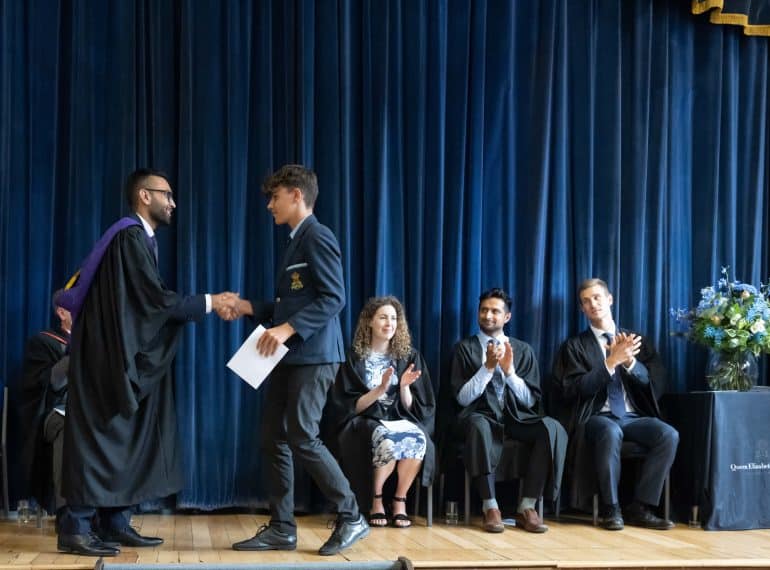
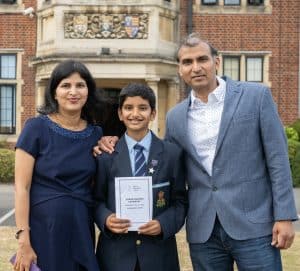 The ceremony saw pupils from Years 7–9 awarded around 75 prizes for academic subjects and extra-curricular activities such as chess, drama and public speaking & debating, as well as other endowed prizes and special awards.
The ceremony saw pupils from Years 7–9 awarded around 75 prizes for academic subjects and extra-curricular activities such as chess, drama and public speaking & debating, as well as other endowed prizes and special awards.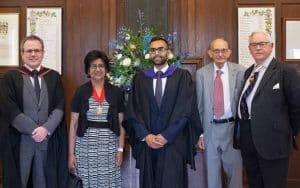 In his speech during the ceremony, Mr Enright alluded to the heatwave and to the legend of Icarus, who flew too close to the sun and paid the price. “Boys, you have kept your cool in the academic heat of QE – in its own way a record-breaking environment; one which absorbs and re-radiates aspiration, intellectual curiosity and positive energy.
In his speech during the ceremony, Mr Enright alluded to the heatwave and to the legend of Icarus, who flew too close to the sun and paid the price. “Boys, you have kept your cool in the academic heat of QE – in its own way a record-breaking environment; one which absorbs and re-radiates aspiration, intellectual curiosity and positive energy.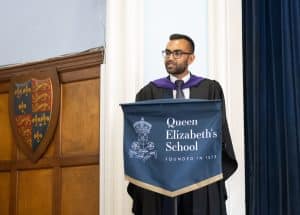 He has served in various voluntary capacities, including as a mentor to pupils at under-performing London schools and as an intern in Mumbai, fundraising and raising awareness in support of poor cancer patients. He previously returned to QE to lead a Sixth Form discussion on Economic Geography.
He has served in various voluntary capacities, including as a mentor to pupils at under-performing London schools and as an intern in Mumbai, fundraising and raising awareness in support of poor cancer patients. He previously returned to QE to lead a Sixth Form discussion on Economic Geography.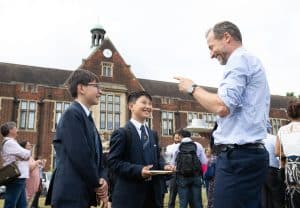 “It takes a single moment to change everything that we take for granted…we are all blessed in one way or another, so live life and leave no regrets.”
“It takes a single moment to change everything that we take for granted…we are all blessed in one way or another, so live life and leave no regrets.”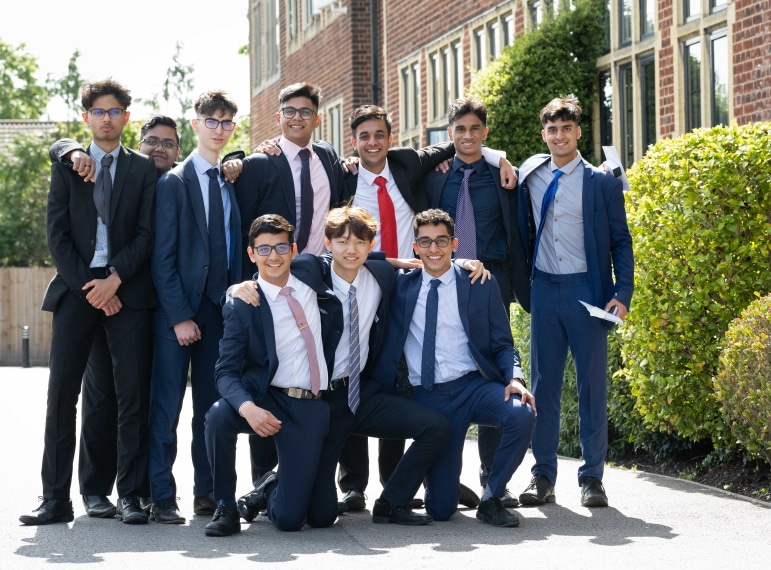
 With their A-level examinations now behind them, all of Year 13 gathered in the Shearly Hall together with parents, teachers and guests for the inaugural event, which brought a mix of fun and the formal to their QE farewell.
With their A-level examinations now behind them, all of Year 13 gathered in the Shearly Hall together with parents, teachers and guests for the inaugural event, which brought a mix of fun and the formal to their QE farewell.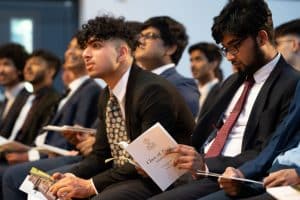 In his speech, Headmaster Neil Enright told the sixth-formers: “Today, we thank you for your fantastic contribution to the life of the School; congratulate you on the completion of your A-levels; wish you the very best for your bright futures; but also repeat our hope that this is not the end of your relationship with QE – merely the beginning of a different phase.
In his speech, Headmaster Neil Enright told the sixth-formers: “Today, we thank you for your fantastic contribution to the life of the School; congratulate you on the completion of your A-levels; wish you the very best for your bright futures; but also repeat our hope that this is not the end of your relationship with QE – merely the beginning of a different phase.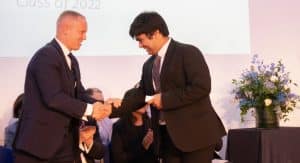 “I hope in the years to come that you will come back and see us; tell us about your adventures and careers; and, more importantly, tell those following in your footsteps through the School. That you will show them and their families the great variety of things that an OE can do and an Elizabethan can be.”
“I hope in the years to come that you will come back and see us; tell us about your adventures and careers; and, more importantly, tell those following in your footsteps through the School. That you will show them and their families the great variety of things that an OE can do and an Elizabethan can be.” “One thing that never changed, however, is the fact that all of us stood together the whole time and always looked out for each other,” said Siddhant.
“One thing that never changed, however, is the fact that all of us stood together the whole time and always looked out for each other,” said Siddhant.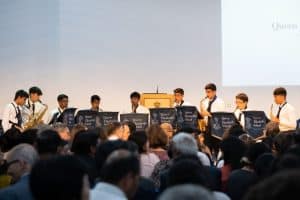 The ceremony was accompanied by music performed by some of the School’s leading musicians. After vocalist and guitarist Aadarsh Khimasia entertained the audience before the ceremony started, the Trumpet Ensemble then performed the processional, Henry Purcell’s Trumpet Tune. Music award-winner saxophonist Conor Parker-Delves enjoyed his swansong as a QE musician, leading a quintet as they played a piece of his own composition, Cherry Fizz, during a musical interlude. The recessional music, played by the Saxophone Ensemble, was Karen Street’s All in Good Time, followed by Coldplay’s Paradise. The Jazz Band played while tea was served.
The ceremony was accompanied by music performed by some of the School’s leading musicians. After vocalist and guitarist Aadarsh Khimasia entertained the audience before the ceremony started, the Trumpet Ensemble then performed the processional, Henry Purcell’s Trumpet Tune. Music award-winner saxophonist Conor Parker-Delves enjoyed his swansong as a QE musician, leading a quintet as they played a piece of his own composition, Cherry Fizz, during a musical interlude. The recessional music, played by the Saxophone Ensemble, was Karen Street’s All in Good Time, followed by Coldplay’s Paradise. The Jazz Band played while tea was served.
 There is praise for every aspect of the School’s work, from the quality of teaching to the behaviour of pupils, and from the huge variety of extra-curricular opportunities through to the work done to prepare pupils for university.
There is praise for every aspect of the School’s work, from the quality of teaching to the behaviour of pupils, and from the huge variety of extra-curricular opportunities through to the work done to prepare pupils for university.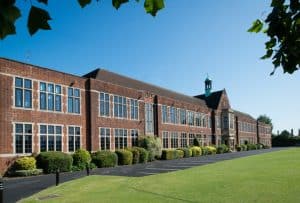 Lead Inspector Annabel Davies and her team began their report with this summary: “Pupils flourish at Queen Elizabeth’s School. They love to learn. Pupils are happy and safe. They take great pride in their work. Pupils are determined to succeed in all aspects of their school life and are ambitious for their futures. Leaders ensure that pupils study a broad range of academic subjects. They make sure the highly academic environment of the school is also a nurturing one.” Borrowing from the language of the School’s mission (“to produce young men who are confident, able and responsible”), the report’s opening paragraph concludes: “Leaders strive to develop pupils into confident, able and responsible young people.”
Lead Inspector Annabel Davies and her team began their report with this summary: “Pupils flourish at Queen Elizabeth’s School. They love to learn. Pupils are happy and safe. They take great pride in their work. Pupils are determined to succeed in all aspects of their school life and are ambitious for their futures. Leaders ensure that pupils study a broad range of academic subjects. They make sure the highly academic environment of the school is also a nurturing one.” Borrowing from the language of the School’s mission (“to produce young men who are confident, able and responsible”), the report’s opening paragraph concludes: “Leaders strive to develop pupils into confident, able and responsible young people.” The inspectors also rated QE’s arrangements for safeguarding as ‘effective’ – a category for which the only possible outcomes are ‘effective’ or ‘ineffective’. The report states: “Staff are acutely aware of the pressures that pupils in the school may face. They prioritise teaching about mental health, managing stress and online safety…The school teaches them the importance of respecting others.”
The inspectors also rated QE’s arrangements for safeguarding as ‘effective’ – a category for which the only possible outcomes are ‘effective’ or ‘ineffective’. The report states: “Staff are acutely aware of the pressures that pupils in the school may face. They prioritise teaching about mental health, managing stress and online safety…The school teaches them the importance of respecting others.”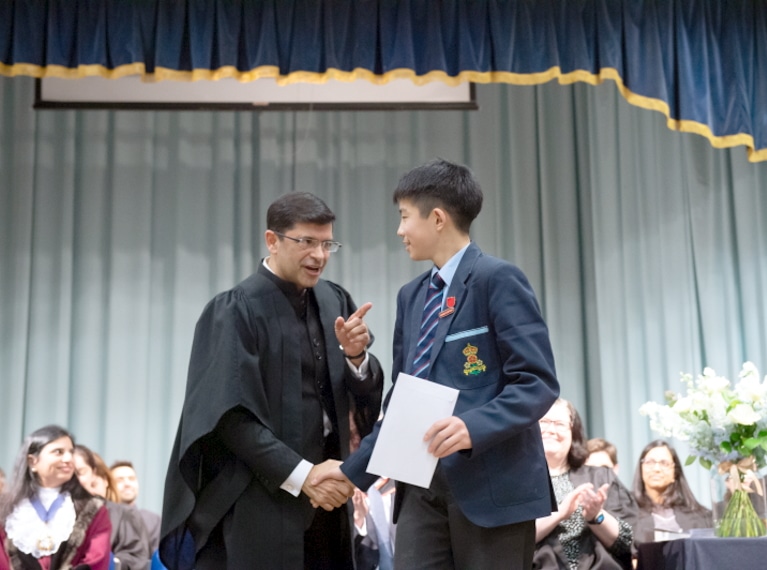
 The formal ceremony in the Main School Hall was this year held in its full format, following the pandemic-restricted event of 2021, with Professor Shitij Kapur the Guest of Honour.
The formal ceremony in the Main School Hall was this year held in its full format, following the pandemic-restricted event of 2021, with Professor Shitij Kapur the Guest of Honour.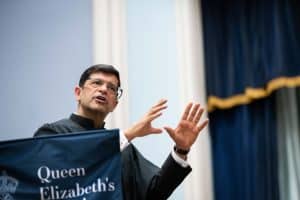 He urged the reading of books, rather than blog posts or articles, and also spoke about how we make decisions in context, pointing out that unpredictable events and developments often govern that context.
He urged the reading of books, rather than blog posts or articles, and also spoke about how we make decisions in context, pointing out that unpredictable events and developments often govern that context.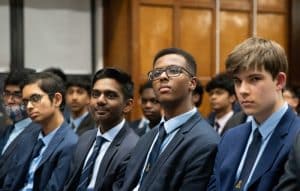 In his speech, the Headmaster highlighted a number of qualities of effective leadership, including bravery, hard work, high standards, low tolerance of bad behaviour, and kindness.
In his speech, the Headmaster highlighted a number of qualities of effective leadership, including bravery, hard work, high standards, low tolerance of bad behaviour, and kindness.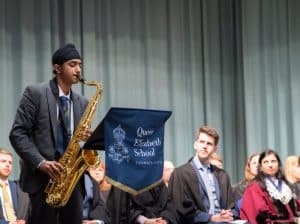 Guests included the Deputy Mayor of the London Borough of Barnet, Councillor Saira Don, who also spoke during the ceremony.
Guests included the Deputy Mayor of the London Borough of Barnet, Councillor Saira Don, who also spoke during the ceremony.